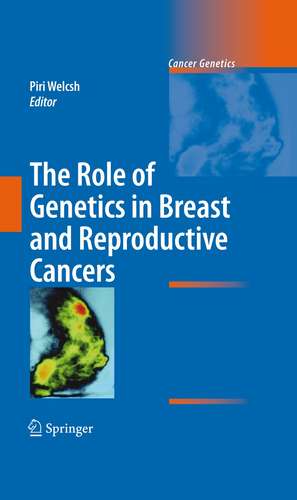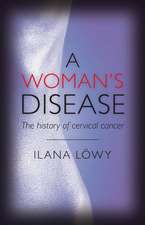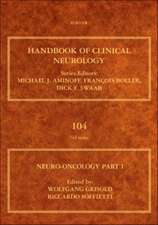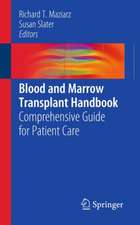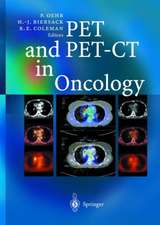The Role of Genetics in Breast and Reproductive Cancers: Cancer Genetics
Editat de Piri Welcshen Limba Engleză Paperback – 25 feb 2012
| Toate formatele și edițiile | Preț | Express |
|---|---|---|
| Paperback (1) | 1413.16 lei 43-57 zile | |
| Springer – 25 feb 2012 | 1413.16 lei 43-57 zile | |
| Hardback (1) | 1418.48 lei 43-57 zile | |
| Springer – 5 noi 2009 | 1418.48 lei 43-57 zile |
Preț: 1413.16 lei
Preț vechi: 1487.54 lei
-5% Nou
Puncte Express: 2120
Preț estimativ în valută:
270.49€ • 293.92$ • 227.36£
270.49€ • 293.92$ • 227.36£
Carte tipărită la comandă
Livrare economică 21 aprilie-05 mai
Preluare comenzi: 021 569.72.76
Specificații
ISBN-13: 9781461424840
ISBN-10: 1461424844
Pagini: 360
Ilustrații: XIV, 344 p. 27 illus.
Dimensiuni: 155 x 235 x 19 mm
Greutate: 0.5 kg
Ediția:2010
Editura: Springer
Colecția Springer
Seria Cancer Genetics
Locul publicării:New York, NY, United States
ISBN-10: 1461424844
Pagini: 360
Ilustrații: XIV, 344 p. 27 illus.
Dimensiuni: 155 x 235 x 19 mm
Greutate: 0.5 kg
Ediția:2010
Editura: Springer
Colecția Springer
Seria Cancer Genetics
Locul publicării:New York, NY, United States
Public țintă
ResearchCuprins
Recognition of Hereditary Breast and Reproductive Cancer Syndromes.- Cancer Genetics in the Clinic: The Challenges and Responsibilities of Counseling and Treating Women at Risk.- Management of Women with Inherited BRCA1 and BRCA2 Mutations.- Genetic etiology of breast and reproductive cancers.- Unclassified Variants in the Breast Cancer Susceptibility Genes BRCA1 and BRCA2.- Recent Advances in Understanding the Cellular Functions of BRCA1.- Recent Advances in Understanding the Cellular Functions of BRCA2.- Genetic Modifiers of Risk of BRCA1- and BRCA2-Related Breast and Ovarian Cancers.- Other Hereditary Breast Cancer Syndromes and Genes.- Ovarian and Endometrial Cancer in Patients with Hereditary Non-polyposis Colorectal Cancer Syndrome.- Somatic Alterations and Implications in Breast Cancer.- Somatic Genetic Development in Epithelial Ovarian Cancer.- Genes and the environment.- High-Frequency Low-Penetrance Alleles.- Host and Viral Genetics and Risk of Cervical Cancer.- Estrogen-Metabolizing Gene Polymorphisms, Genetic Susceptibility, and Pharmacogenomics.- The Future of Discoveries in Breast and Reproductive Cancers: The Genome and Epigenetics.
Notă biografică
Piri L. Welcsh, PhD is a Research Assistant Professor in the Department of Medicine, Division of Medical Genetics at the University of Washington. She received her PhD in Molecular Genetics from The Ohio State University. It was during this time that the seminal paper in which Dr. Mary-Claire King demonstrated that a single gene on chromosome 17, later known as BRCA1, was responsible for many breast and ovarian cancers was published. During Postdoctoral studies at the University of Texas Southwestern Medical Center in Dallas, Dr. Welcsh worked under the guidance of Dr. Anne M. Bowcock and collaborated with Drs. Mary-Claire King and Francis Collins in an attempt to clone BRCA1. Shortly after the gene encoding BRCA1 was identified, Dr. Welcsh joined the research group of Dr. King at the University of Washington where she conducted studies designed to elucidate the biological function of BRCA1. She is currently an independent investigator whose current research goals include the identification and characterization of both genetic and epigenetic mechanisms critical to the development of breast and ovarian cancer.
Textul de pe ultima copertă
Of all factors contributing to breast cancer, family history of disease is the most powerful. Currently, our understanding of genetic predisposition to breast cancer includes three classes of genes as defined by their associated risks. BRCA1 and BRCA2 are high-penetrance breast cancer predisposition genes. Since the cloning of BRCA1 and BRCA2, inherited mutations in an additional 8 genes, all of which are functionally related to BRCA1 and/or BRCA2, have been shown to variously confer a low-intermediate increased breast cancer risk. Furthermore, recent genome-wide association studies have uncovered eight common variants associated with low-penetrance breast cancer predisposition. Despite these discoveries, most of the familial risk of breast cancer remains unexplained.
The Role of Genetics in Breast and Reproductive Cancers is divided into three parts: Recognition of Hereditary Breast and Reproductive Cancer Syndromes, Genetic etiology of breast and reproductive cancers, and Genes and the environment. In the first section, we discuss how genetic counselors and clinicians acknowledge hereditary breast and reproductive cancer syndromes, with an emphasis on the challenges and responsibilities of counseling women in understanding the role of family history in dictating personal cancer risk. This section includes a detailed discussion of the current recommendations for clinical management of women with inherited mutations in BRCA1 and BRCA2.
Section II focuses on the impact of inherited mutations in known breast cancer genes on the etiology of breast and reproductive cancers, and the challenges of determining cancer risk when genetic testing reveals variants of unknown consequence in BRCA1 and BRCA2. Because the cellular function of BRCA2 has so elegantly been revealed, we devote a chapter to the current understanding of BRCA2 function and how loss of function contributes to disease development. In addition, we present a discussion ofgenetic modifiers of risk of BRCA1- and BRCA2-related cancers, and chapters on other hereditary breast cancer syndromes and genes, and ovarian and endometrial cancers in patients with Hereditary Non-Polyposis Colorectal Cancer syndrome. Finally, we conclude this section with two chapters that respectively discuss somatic alterations in breast and in ovarian cancer.
The third and final section discusses how recent advances in genomic technologies are being applied to decipher the intricate relationship between genetic variation and the environment, to better predict individual cancer risk, and to development of reagents for disease prevention and treatment. We conclude with a discussion of the role of epigenetics in breast and ovarian cancer development. This final chapter focuses on the exciting prospect that epigenetic changes can be used as predictive and prognostic biomarkers and, because they are reversible, targets for development of pharmacologic reagents to manage disease.
Piri L. Welcsh, PhD is a Research Assistant Professor in the Department of Medicine, Division of Medical Genetics at the University of Washington. She received her PhD in Molecular Genetics from The Ohio State University. It was during this time that the seminal paper in which Dr. Mary-Claire King demonstrated that a single gene on chromosome 17, later known as BRCA1, was responsible for many breast and ovarian cancers was published. During Postdoctoral studies at the University of Texas Southwestern Medical Center in Dallas, Dr. Welcsh worked under the guidance of Dr. Anne M. Bowcock and collaborated with Drs. Mary-Claire King and Francis Collins in an attempt to clone BRCA1. Shortly after the gene encoding BRCA1 was identified, Dr. Welcsh joined the research group of Dr. King at the University of Washington where she conducted studies designed to elucidate the biological function of BRCA1. She is currently an independent investigator whose current research goals include the identification and characterization of both genetic and epigenetic mechanisms critical to the development of breast and ovarian cancer.
The Role of Genetics in Breast and Reproductive Cancers is divided into three parts: Recognition of Hereditary Breast and Reproductive Cancer Syndromes, Genetic etiology of breast and reproductive cancers, and Genes and the environment. In the first section, we discuss how genetic counselors and clinicians acknowledge hereditary breast and reproductive cancer syndromes, with an emphasis on the challenges and responsibilities of counseling women in understanding the role of family history in dictating personal cancer risk. This section includes a detailed discussion of the current recommendations for clinical management of women with inherited mutations in BRCA1 and BRCA2.
Section II focuses on the impact of inherited mutations in known breast cancer genes on the etiology of breast and reproductive cancers, and the challenges of determining cancer risk when genetic testing reveals variants of unknown consequence in BRCA1 and BRCA2. Because the cellular function of BRCA2 has so elegantly been revealed, we devote a chapter to the current understanding of BRCA2 function and how loss of function contributes to disease development. In addition, we present a discussion ofgenetic modifiers of risk of BRCA1- and BRCA2-related cancers, and chapters on other hereditary breast cancer syndromes and genes, and ovarian and endometrial cancers in patients with Hereditary Non-Polyposis Colorectal Cancer syndrome. Finally, we conclude this section with two chapters that respectively discuss somatic alterations in breast and in ovarian cancer.
The third and final section discusses how recent advances in genomic technologies are being applied to decipher the intricate relationship between genetic variation and the environment, to better predict individual cancer risk, and to development of reagents for disease prevention and treatment. We conclude with a discussion of the role of epigenetics in breast and ovarian cancer development. This final chapter focuses on the exciting prospect that epigenetic changes can be used as predictive and prognostic biomarkers and, because they are reversible, targets for development of pharmacologic reagents to manage disease.
Piri L. Welcsh, PhD is a Research Assistant Professor in the Department of Medicine, Division of Medical Genetics at the University of Washington. She received her PhD in Molecular Genetics from The Ohio State University. It was during this time that the seminal paper in which Dr. Mary-Claire King demonstrated that a single gene on chromosome 17, later known as BRCA1, was responsible for many breast and ovarian cancers was published. During Postdoctoral studies at the University of Texas Southwestern Medical Center in Dallas, Dr. Welcsh worked under the guidance of Dr. Anne M. Bowcock and collaborated with Drs. Mary-Claire King and Francis Collins in an attempt to clone BRCA1. Shortly after the gene encoding BRCA1 was identified, Dr. Welcsh joined the research group of Dr. King at the University of Washington where she conducted studies designed to elucidate the biological function of BRCA1. She is currently an independent investigator whose current research goals include the identification and characterization of both genetic and epigenetic mechanisms critical to the development of breast and ovarian cancer.
Caracteristici
Will explore the latest findings in research into the genetics of breast and reproductive cancers
